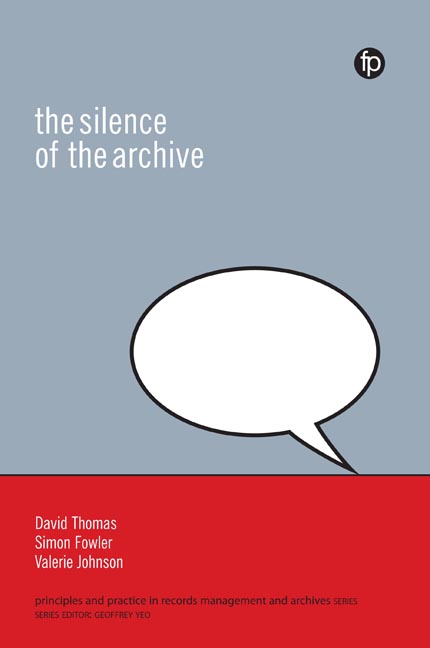Book contents
6 - Solutions to the silence
Published online by Cambridge University Press: 08 June 2018
Summary
Introduction
This book has described a number of factors which have resulted in gaps in the information held by archives: what we have termed silences. This chapter will discuss the role of various actors in the documentary and archival process in filling those gaps, the joint responsibility for change, and possible paths ahead to avoid new gaps appearing in the future.
Is legislation the answer?
First to the question of who is responsible for the documentation of society. It has been the implicit argument of this book that we are all responsible, whether as creators of records or professional curators of those papers, or as users, researchers, historians, and informed citizens of societies to whom we have responsibility.
Of course, in every state and country, there exists legislation, which lays down legal duties and responsibilities relating to records. But life is about more than legislation, and legislation itself can have unintended consequences. The Freedom of Information Act in the UK was heralded as opening up access to information much sooner than previously, and as a vehicle towards greater government accountability and transparency. However, fears have also been expressed that it is leading creators to avoid writing down information that is subject to the Act or other accountability initiatives, to preclude its disclosure (for this view, see, for example, Moss, 2012).
Sebina (2009), writing on the implications of the passing of the Promotion of Access to Information Act (PAIA) in South Africa in 2000, remarked that it has by no means led to full and open access. Fear of taking responsibility for the decision to open, fear of recriminations for one's own career or simply a general culture of fear can lead to a default to closure. Findlay has hinted of similar issues in Australia:
… here in Australia, despite much talk of an ‘open government’, the reality for those seeking to extract information under Freedom of Information (FOI) laws can be quite the opposite. Too often, vague references to national security are used to exempt material, part of the longer theme of fear, paranoia and secrecy that has underpinned much public policy since 9/11.
(Findlay, 2013, 9)- Type
- Chapter
- Information
- The Silence of the Archive , pp. 141 - 162Publisher: FacetPrint publication year: 2017
- 1
- Cited by



